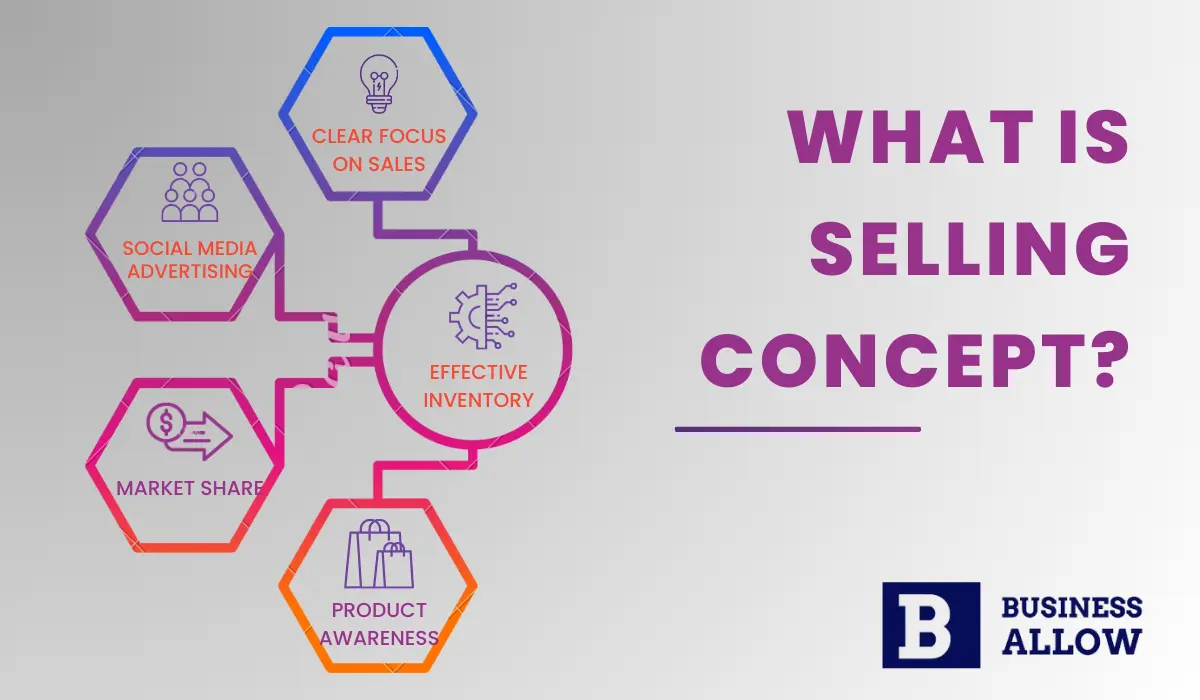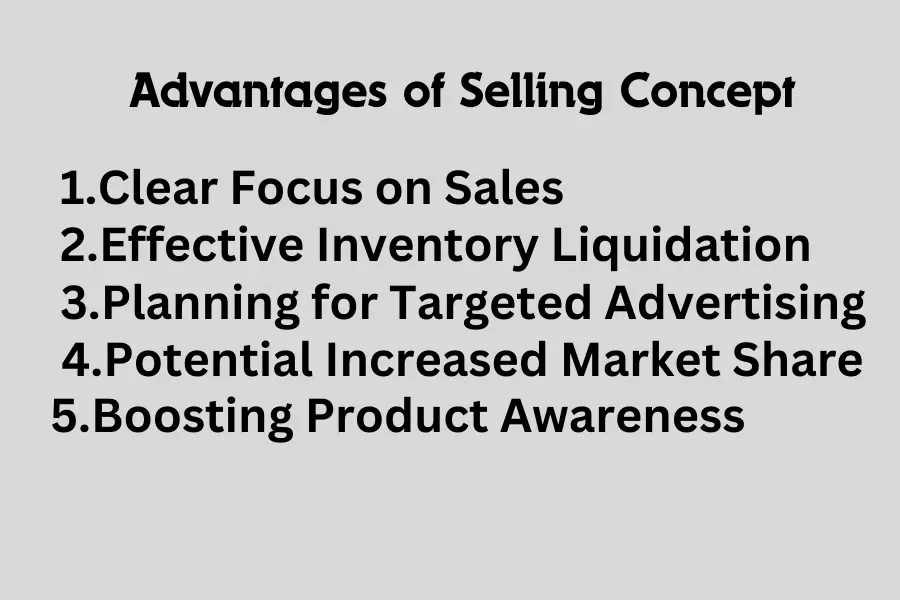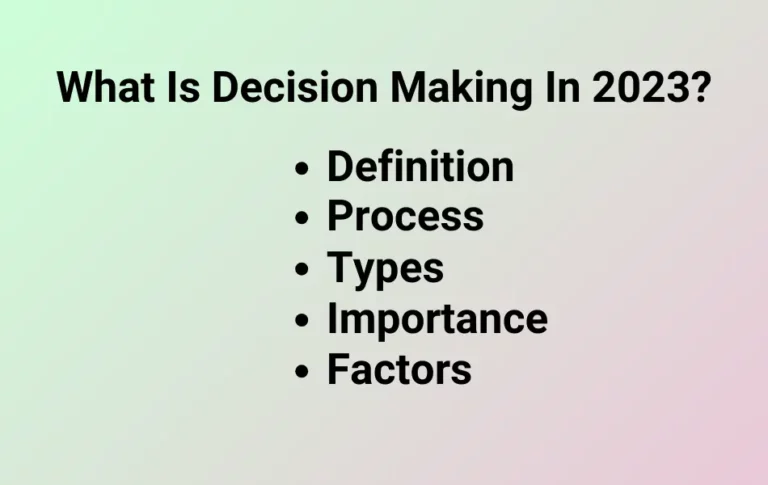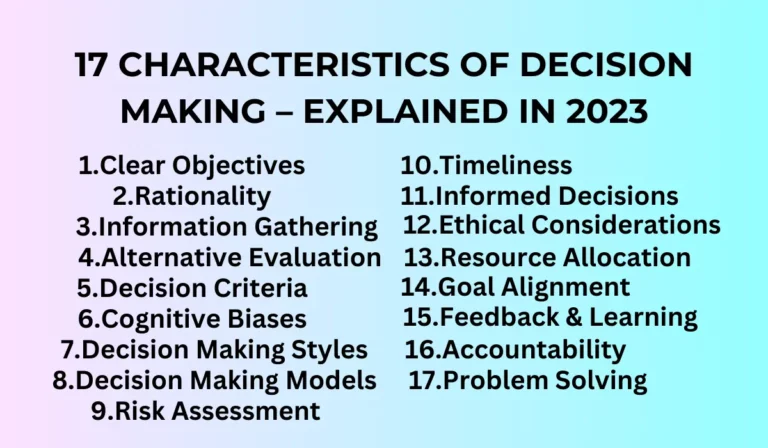Selling Concept: Definition, Importance, Pros & Cons – Explained In 2024

The world of business uses different kinds of strategies and concepts to sell products and generate profits. One such effective strategy that has been used over the years is the Selling Concept. This concept revolves around the idea that customers will not buy a product or service unless persuaded to do so through aggressive sales and promotional activities. This blog post will explain the updated concept of selling, industrial examples, pros and cons and the future in the modern market. (2024)
Content Outline
Definition And Importance of Selling Concept
The “Selling Concept” in business means trying to sell things aggressively instead of understanding and meeting customers’ actual needs.
Importance of Selling Concept In Various Industries:
The Selling Concept, despite not being a customer-oriented approach, holds significant importance in various industries. The concept has proven successful in sectors that deal with unsought goods—products or services that customers do not typically realize they need until a company persuades them with compelling promotional activities.
For example, in the insurance industry, customers may not understand the importance of a particular policy until a salesperson persuades them. Similarly, in the fitness industry, gyms often use selling methods to encourage people to become members.
The Advantages of the Selling Concept

- Clear Focus on Sales
The selling concept puts an emphasis on quantity over quality. This concept operates under the assumption that customers will not purchase products of their own accord; instead, businesses need to aggressively promote their products to ensure sales. This approach provides a clear directive for businesses to focus solely on sales volume. It streamlines operations by focusing efforts on selling products or services aggressively without having to worry about understanding customer needs. This approach can work well when dealing with unsought goods or industries with less differentiated products.
- Effective Inventory Liquidation
Another advantage of the selling concept is that it ensures effective inventory liquidation. In essence, operations are geared toward selling what is already available, rather than adapting product offerings to customer needs or desires. By putting more energy into pushing products out the door, businesses can reduce storage costs, improve cash flow, and decrease the risk of obsolescence or waste. When a company has excessive stock, a robust sales strategy can help sell off products rapidly.
- Planning for Targeted Advertising
The selling concept focuses on creating ads that directly promote the benefits and features of products. The primary goal of these advertising efforts is to persuade and convince viewers to make a purchase. Businesses employing the selling concept understand their advertising needs to evoke immediate responses and inspire quick purchasing decisions. Planning for such targeted advertising is more straightforward because its aim is linear—sell the product without considering the customer’s long-term needs or developing relationships.
- Potential Increased Market Share
By its very nature, the selling concept is aggressive in terms of market strategy. Companies often deploy extensive promotional activities to push for sales, which can result in a higher market share. If a business does particularly well, it may outperform competitors in terms of sales and thus secure a larger slice of the market. Despite being a short-term strategy, an aggressive selling campaign can help a brand rapidly increase its share in a saturated market.
- Boosting Product Awareness through Sales
High sales activity can result in increased product awareness. The reason is simple – the more people see and buy a product, the more they know about it. The selling concept can make a product ubiquitous within a market, as the primary focus is product distribution and sales. Frequent advertising and aggressive promotion can keep the product at the forefront of people’s minds. This way, even if the focus isn’t on building long-term relationships, high customer interaction within the buying process can make the product or brand more recognizable, thereby boosting product awareness.
Limitations of the Selling Concept – You Need To Know In 2024
- Overlooking Customer Needs
The selling concept mostly involves focusing on selling available products without necessarily understanding what the customers need or want. In this sense, it is more about the business pushing their products onto customers rather than serving the actual needs or requirements of those customers. So, a company might be selling a product rapidly, but it could be a product that the customers don’t really need or want. The problem here is that this approach might work in the short run, but in the long run, customers might feel unsatisfied and decide to stop buying the product.
- Ignoring Marketing Basics
The selling concept mostly overlooks some basic principles of marketing, like building relationships with customers and understanding their preferences and behaviors over time. Companies that use a selling concept might be so focused on making sales that they forget to build these essential relationships. They might not try to understand why customers are buying their products or what they really think about them. This can miss out on important opportunities to make improvements or build stronger bonds with customers.
- Short-term Focus
Often businesses using the selling concept are primarily interested in making a quick sale. This introduces a very short-term focus, where the aim is to sell as much as possible right now, without thinking about the future. The difficulty with this short-term focus is that it doesn’t aim to keep customers over the long term. It’s more about making a one-time sale than about creating loyal customers who will keep coming back in the future.
Difference Between Selling Concept and Marketing Concept
The selling concept and the marketing concept have distinct differences in their approach to business, mainly by focusing on different aspects of the sales process. Let’s look at the selling vs marketing concept infographic to understand the differences in a better way.
- Approach towards Customers:
- The Selling Concept takes a product-centric approach, which means it places the product at the center of everything it does. This concept operates on the idea that customers need persuasion to buy products. The main goal is to achieve high sales even if the customers don’t need the product. The products are sold, not necessarily bought. For example, sales pitches for insurance policies can be aggressive, pushing the customer to buy without assessing if they truly need the coverage offered by the policy.
- The Marketing Concept, on the other hand, takes a customer-centric approach. It starts with identifying the needs and wants of the target market and then strives to meet those needs with its products or services. This concept assumes that customers will favor those products that offer the most quality, performance, or innovative solutions. Thus, with the marketing concept, products are bought, not sold. An example would be a smartphone company that researches what features consumers value the most, and then designs its products around these insights.
- Objective of the Concept:
- The Selling Concept is primarily focused on achieving high sales volume. It views business as a process of selling existing products, and success is measured by the quantity sold. The selling concept assumes that customers will not buy the firm’s products unless they are persuaded to do so through selling effort. As a result, companies spend a lot of time promoting and selling their products to achieve their sales goals.
- The Marketing Concept’s objective is not solely about making a sale; it’s about satisfying customer needs, which in turn helps in building a relationship with customers. The marketing concept’s success is measured in terms of customer satisfaction. Firms adopting the marketing concept believe that their mission is not to sell what they can make, but to make what the market needs.
- Duration and Sustainability:
- The Selling Concept is generally a short-term business approach due to its aggressive sales tactic. The relationship between the seller and the customer usually ends after the sale has been made, focusing less on building a long-term relationship.
- On the other hand, the Marketing Concept aims for the long term. It believes in building a lasting relationship with the customer. When customers feel satisfied and their needs are met, they are more likely to trust, support and promote the business in the long run.
Related: 4Ps marketing mix
Real World Examples In Various Industries
- Insurance Industry
The insurance sector often applies the selling concept, especially life insurance companies. Given that insurance is typically an unsought service—meaning customers often do not recognize they need it until they are prompted—insurance companies use aggressive selling tactics to convince potential customers of the necessity of their services. They focus heavily on the consequences of not having insurance while emphasizing the benefits that each policy provides.
- Fitness Industry
Many gyms and fitness centers adopt the selling concept by applying high-pressure sales techniques to sign up members. For instance, they might offer limited-time discounts or promotional offers that pressure the customers to make a quick decision before the offer ends.
- Telecommunications Industry
Many telecommunication companies, especially those selling cable or satellite TV packages, often adopt the selling concept. They use aggressive selling strategies and promotions to draw customers into long-term contracts.
- Automotive Industry
Car dealerships often exemplify the selling concept, focusing on moving inventory regardless of the customer’s needs or wants. Sales representatives may try to sell high-end models with numerous features, even if it doesn’t fit the customer’s requirements.
- Timeshare Industry
The timeshare industry is notorious for using the selling concept, with high-pressure sales presentations designed to convince attendees to purchase a timeshare on the spot.
The Future of Selling Concept in the Modern Market 2024
Shift from Selling to Marketing
In several businesses, a substantial change from the old selling concept to the marketing concept has been noted in recent years. This is primarily due to changes in consumer behavior and technological improvements. The selling concept has become less effective since today’s customers have access to a world of possibilities at their fingertips and have developed a stronger voice in their purchasing decisions. This shift focuses on a more customer-centric strategy, which is central to the marketing philosophy. Instead of simply selling a product, it focuses on understanding and addressing the requirements of clients. This can lead to increased client satisfaction, which can lead to loyalty and repeat purchases.
In 2024, selling stuff will get even more personalized. Companies will use smart technology to figure out what you like before you even say it. You can try things out in a virtual world before buying them. Also, they’ll use something called blockchain to make sure everything is fair and honest, so you can trust them more when you buy things.
Role of Technology and Digital Platforms
The advent of technology and digital platforms has drastically changed the sales techniques companies employ. Today’s consumers have become tech-savvy, and they demand seamless and personalized experiences. Therefore, businesses now leverage data-driven insights to offer personalized recommendations, improving customer engagement and increasing sales. Artificial intelligence and machine learning in 2024 are being applied to analyze customer behavior and predict future purchase patterns. Furthermore, digital platforms like social media, e-commerce marketplaces, and websites offer businesses a means to reach out to a global customer base. These platforms are not just used for selling but also for understanding customer needs, preferences, and feedback.
Related: core concepts of marketing
Emerging Trends and Predictions for Future Practices
Looking towards the future, the selling concept is likely to evolve further with new technologies and market trends:
- Integration of Augmented Reality (AR) and Virtual Reality (VR)
These technologies could revolutionize the way products are demonstrated and sold, providing customers with immersive experiences and a way to ‘try before they buy.’
- Direct-to-Consumer (D2C) Approach
Many manufacturers and brands are anticipated to bypass traditional retail channels and take a direct-to-consumer approach as a means to sell their products.
- Social Commerce
The trend of purchasing directly from social media platforms is expected to grow, with platforms like Instagram and Facebook continually improving their shopping features.
- Sustainability and Ethics
Modern consumers are not only concerned about the product they buy but also the values of the company they are buying from. Selling practices in the future will need to align with ethical and sustainable values.
Conclusion
In conclusion, the selling concept holds value in today’s competitive market. However, it must be balanced with a thorough understanding of customer needs. With evolving technology and market trends, businesses must adapt their sales strategies, combining aggressive promotion with valuable customer relationships for sustainable success.






